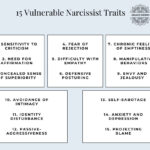Interdependence VS Codependency: What Can Make Or Break Your Relationship
Are you confused about the difference between interdependence vs codependency?
To maintain healthy relationships, interdependence is key. It allows both parties to establish a strong emotional bond, while maintaining autonomy and a strong sense of self.
Codependency is when one partner relies on the other for validation and self-worth. This drives them to neglect their own needs, while always focusing on pleasing others. People with codependency issues have people pleasing tendencies, low self-esteem, and are more likely to end up in toxic and narcissistic relationships.
Let’s explore the signs between interdependence vs codependency, the different dynamics, and how they impact your relationship with your significant other.
Interdependence vs codependency in relationships

Interdependence is different from codependency. In an interdependent relationship there’s equal power, emotional support and intimacy. Both partners know that they can rely and trust on each other, while giving each other space to grow. If the couple gets too enmeshed, the romantic bond can turn into codependency.
When you’re in love, it’s understandable to feel attached, to desire intimacy, and to depend upon each other. Your lives are intertwined, and your choices affect one another. However, this doesn’t mean that it’s okay to suffocate each other, and inhibit personal development as individuals. That kind of behavior can lead to the destruction of a relationship over time.
If you don’t have a solid self-esteem, and a strong sense of self, you might develop codependency issues which can negatively impact your relationship.
Codependency can vary, but it generally comes from fear of abandonment in relationships. People with codependency develop like an addiction to their partner, and an excessive emotional or psychological reliance on them. They end losing themselves along the relationship, and need their partner for validation to boost their self-esteem.
Related article: How To Overcome Fear Of Abandonment | How To Fix Codependency
Differences between interdependence vs codependency in romantic relationships
Interdependence:
Both parties in the relationship are not afraid to show their vulnerabilities to each other. They are able to turn to each other and form a strong emotional bond without fearing intimacy.
When you are in an interdependent relationship, you value your sense of self and identity. So you are able to form an emotional bond without losing yourself along the way in the relationship.
Interdependence allows you and your partner to be yourselves without having to compromise who you are, your values and principles. In an interdependent relationship, a couple supports one another and gives space for individual growth. Usually people who are interdependent have a healthy and secure attachment style.
Codependency:
Codependent relationships are unhealthy for both parties involved. People with codependency struggle with anxious thoughts, self-autonomy, and fail to give their partner space to grow.
People with codependency need to feel needed, otherwise they struggle with feelings of unworthiness and low self-esteem. They have people pleasing tendencies and go out of their way to fulfill their partners’ needs.
As a result, they end up making sacrifices even when not expected by their partner. When codependents do not get the amount of attention or affection they were hoping for, they end up feeling frustrated and unappreciated. This leads to feelings of resentment in their relationship.
Being in a relationship with someone who has codependency can feel rather tiring and suffocating. Long-term this kind of behavior is not sustainable and ends up causing issues in the relationship.
Related article: What’s The Difference Between Codependency VS Love
Understanding codependency
Understanding codependency and the signs of codependence help you identify the personality traits within yourself. Becoming aware of these characteristics is the first step towards changing your unhealthy behavioral patterns in your relationship.
By changing your codependency traits and shifting toward the dynamics of an interdependence relationship, you will maintain healthier relationships, and save yourself a lot of drama!
Signs of codependency in a relationship:
- Feeling responsible for your partner’s feelings
- You fear abandonment or staying alone
- You have poor boundaries
- Difficulty adjusting to change
- Struggling to make decisions and doubt yourself
- You tend to sacrifice your own needs to please your partner
- Difficulty controlling your emotions and tend to be impulsive
- You tend to be controlling and clingy
- Lacking personal interests or goals outside the relationship
- You struggle to find time for yourself
- You feel that you’ve lost your sense of self within the relationship.
Why interdependence leads to healthy relationships
Interdependence allows both partners to maintain a balance between relying on each other and being autonomous. It prevents the relationship from becoming too enmeshed.
In interdependent relationships, both partners choose to be with each other, rather than feeling like they need each other.
Partners are less likely to feel suffocated and feel that they have space for personal growth. This leads to a stronger bond between interdependent couples, healthy communication and emotional stability.
Related: Emotional Intelligence in Relationships
Interdependence characteristics in a relationship
Let’s have a look at the following characteristics found in an interdependent relationship:
- Healthy and solid boundaries
- Time for yourself and personal interests
- Clear and healthy communication of needs and emotions
- Making each other feel safe to be vulnerable
- Emotional intimacy and emotional connection
- Healthy self-esteem and a strong sense of self
- Feeling like both parties can rely on each other
When partners feel valued and appreciated, they are able to feel safe and comfortable to be independent. Being interdependent does not mean that you are alone in the relationship, or that you don’t care for each other. It’s an understanding between partners that they can trust each other and maintain their sense of self separate from each other.
How to build an interdependent relationship
The first step toward building an interdependent relationship is to be mindful of your behavioral patterns. I’ve seen many people entering relationships to avoid being alone. Many couples stay stuck in relationships even if they’re unhappy just because they don’t want to be alone.
To sustain interdependence in a relationship, it’s important to be aware of your personal goals, values, and boundaries. That way, when you enter in a relationship, you can discuss with your partner how you can support each other to achieve your personal goals, respect each other’s values, and build new goals together.
Before entering into a relationship, it’s good to spend some time reflecting on the person and see whether you are aligned. This will ensure that you enter your new relationship with awareness that is critical for the foundation of an interdependent relationship.
The following characteristics help you maintain a sense of self in a relationship and support interdependence:
- Being aware of what you like and what matters to you
- Knowing how to communicate your needs and emotions
- Spending time with friends and family
- Pursuing personal goals
- Embracing your principles and values
- Dedicate time for hobbies and interests
- Being mindful of your behavioral patterns
- High emotional intelligence (increased self-awareness, self-regulation, self-motivation, empathy)
Related: How To Break Codependency
Why people with codependency are more likely to have relationships with narcissists?

Codependents struggle with establishing solid boundaries, have people pleasing tendencies, and low self-esteem.
These characteristics make them more vulnerable to narcissists. Narcissistic people seek partners who can fulfill their needs and provide them with narcissistic supply. They take advantage of people as they feel that they are entitled to special treatment, and disrespect people’s boundaries.
People with codependency fear being abandoned and feel responsible for other people’s feelings. So they get stuck in a cycle where they go out of their way to please the narcissist. The narcissist never feels fulfilled, and ends up taking advantage of the codependent and engage in abusive behavior.
Related article: How To Stop Being Codependent With A Narcissist.
Beyond codependency in 4 steps
If you have identified the patterns of codependency, don’t panic. With some inner work and self-awareness, you can start working on the relationship with yourself to fix your codependency issues.
Here are some steps which you can follow to shift to a healthy dynamic in your relationship:
1. Dedicate time for yourself.
The most important relationship to work on is the one with yourself. You might be used to abandoning your feelings and putting the relationship above everything else in your life. As a result, you lose your sense of self and you might not know what you think and feel anymore.
Dedicating time for yourself might feel uncomfortable and unnatural at first. You don’t know how to spend time with yourself and you don’t enjoy it. But this is of utmost importance to help you reconnect with yourself and get to know what you like and what you dislike.
Tips to explore yourself and find new passions:
- spend time reading (explore what kind of books you like)
- join a book club
- join a community group (physical activity, volunteering, music etc…)
- enroll for a course to learn new skills
- go for walks alone in nature
- practice yoga or meditation
- take yourself out on a date and buy yourself a delicious meal
It will boost up your confidence and help you discover hobbies, dreams, goals and what you’re passionate about. This will also have a good effect on your relationship as it helps you become more interesting as a person.
2. Establish solid boundaries.
People with codependency have poor boundaries. They feel uncomfortable asserting their needs, communicating their emotions, and saying no to people.
Initially this will feel uncomfortable. Start by taking small steps for example when your partner asks you what you would like to eat, or where would you like to go, express yourself and make the decision.
Another good practice would be saying no when someone asks you to do something and it is inconvenient for you. If someone invites you to an event which you would not like to go to, politely decline the invitation. Just because you politely decline, does not mean that you are being rude!
By time, it will become easier for you saying no to people and asserting your needs. Establishing solid boundaries is essential if you want to shift toward an interdependent relationship. Otherwise, you keep being submissive and more susceptible to manipulation.
3. Practice self-care
As a codependent, you’re probably an expert at taking care of your partner, but don’t really know how to take care of yourself. Knowing how to take care of yourself is a vital step that will help you move toward and interdependent relationship.
Self-care will help you recover from codependency and break free from codependent tendencies like clinging to your partner. Otherwise, interdependency cannot exist.
It’s okay if you don’t know what you like at first, and how you can take care of yourself. Start by trying different things and explore what you like and what you don’t like.
Tips for self-care which you can try to see what you like:
- meditate
- connect with friends
- spend some relaxing time at the spa
- prepare healthy meals for yourself
- dedicate time for physical exercise
- know when to take a break from your roles and just be
- repeat / write down in your journal codependency affirmations to reprogram your brain
Practicing self-care is an important step to go beyond codependency and fix your codependency issues. It will give you a sense of autonomy and self-reliance as you affirm to yourself that you know how to take care of yourself. Rather than relying on fulfilling your partner’s needs to feel good about yourself, you boost your self-confidence by taking care of your own needs!
Related article: What It Means To Really Love Yourself
4. Seek support through counseling
Shifting from a codependent relationship to interdependence can be challenging. Change scares most codependents as they fear that they might lose their partner if they don’t prioritize their partners’ needs over theirs.
Seeking support through counseling can help you to start shifting to interdependence and guide you step by step throughout the process of change and transformation. You can learn new skills to gracefully move away from being codependent and build a healthy self-esteem.
Interdependence is healthier in a relationship and your partner might even feel relieved with this change. It’s a good idea to communicate how you are feeling with your partner and ask for support. A truly loving and understanding partner will support you through this change.
If you are with someone who enjoys taking advantage of you, you might want to question whether you would want to stay in that kind of relationship. Is it really in your best interest to stay with someone who wants you to be codependent on them?
It’s okay if your feel overwhelmed and scared by this change in your life. With the right support and guidance you can break free from your codependency and anxiety triggered by it. It’s truly liberating knowing that you can be yourself, take care of yourself, while also sustaining a good and healthy relationship with your partner!
Choosing interdependence over codependency
Interdependence compared to codependency is healthier and leads to more fulfilling relationships.
Allowing your partner and yourself space for personal growth is key to establishing a healthy, interdependent relationship.
Interdependence creates a safe space for both partners to turn toward each other intimately, without fearing that they will lose themselves or be controlled and manipulated.
FAQ
Interdependence allows space for personal growth and autonomy, while maintaining emotional intimacy and a strong sense of self. In codependent relationships, one or both partners lack self-reliance and need one another to feel good about themselves. Codependents fear being alone and neglect themselves to please others.
An interdependent relationship is when both partners trust and rely on each other, but don’t lose their sense of self in the relationship. They support each other, and continue to pursue personal goals. An interdependent relationship creates a safe space for both parties to be vulnerable and build emotional intimacy.
When you’re clingy to your partner and avoid being alone, you’re in a codependent relationship. In an interdependent relationship you choose to be with your partner instead of needing to be. You still feel okay when you’re not together and know how to spend time alone.
References:
- https://www.webmd.com/mental-health/signs-codependency
- https://www.webmd.com/sex-relationships/features/signs-of-a-codependent-relationship
- https://www.sciencedirect.com/science/article/abs/pii/S0167811696000067
Related article:
Codependency Triangle In Narcissistic Relationships






